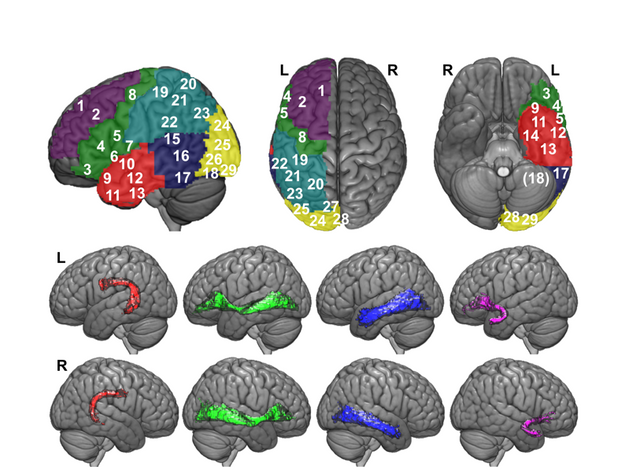Neural Markers
Recent advances in neuroimaging techniques have enhanced our understanding of neural plasticity and brain reorganization after stroke for people with aphasia. Some of our studies in the lab seek to evaluate the functional and structural changes in the brain that can be observed in patients with language impairment as a result of stroke and over the course of treatment and recovery.
We accomplish this by employing a variety of the most current neuroimaging techniques to examine and track changes in neural biomarkers. Recent and current studies in our lab have included the use of functional magnetic resonance imaging (fMRI), diffusion tensor imaging (DTI) and functional near-infrared spectroscopy (fNIRS). In one line of research, we analyze differences in patterns of brain activation during language tasks, non-linguistic cognitive tasks and at rest. In addition, structural imaging data enable us to examine consequences of stroke on the anatomy of neural networks and on brain tissue health, at and beyond the lesion.
The investigation of structural and functional connectivity, as well as overall brain health, will help us predict treatment outcomes and better understand inter-individual variability in language recovery from acute to chronic stages. Our aim is to create new models that will improve personalization and treatment effects for people with aphasia by characterizing neurophysiological factors that affect recovery of language abilities.
Ongoing Studies
- Multiple Demand Network (MD Study)
- White Matter Connectivity
- Small Vessel Disease (SVD)
- Multi-Voxel Pattern Analysis (MVPA)
- Projects on Language Recovery Using fMRI
- Voxel-Based Lesion-Symptom Mapping Applied to Calculation Performance in Aphasic Patients
Recent Publications and Presentations
Gu, Y., Bahrani, M., Billot, A., Lai, S., Braun, E. J., Varkanitsa, M., Bighetto, J., Rapp, B., Parrish, T. B., Caplan, D., Thompson, C. K., Kiran, S., & Betke, M. (2020, June). A machine learning approach for predicting post-stroke aphasia recovery: A pilot study. Paper presented at PETRA ’20: The 13th PErvaseive Technologies Related to Assistive Environments Conference (PETRA), Virtual. DOI: 10.1145/3389189.3389204
Billot, A., Lai, S., Varkanitsa, M., Braun, E. J., Gu, Y., Bahrani, M., Bighetto, J., Rapp, B., Parrish, T. B., Caplan, D., Thompson, C. K., Betke, M., & Kiran, S. (2020, October). Predicting post-stroke aphasia recovery from multimodal neuroimaging data. Oral presentation at the 11th World Congress for Neurorehabilitation, Virtual.




